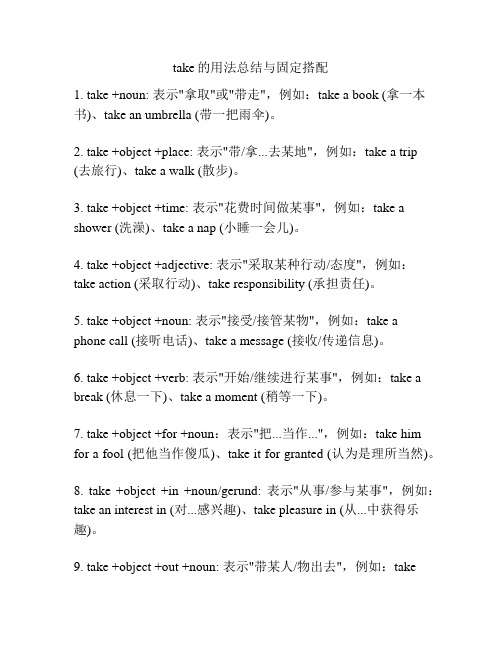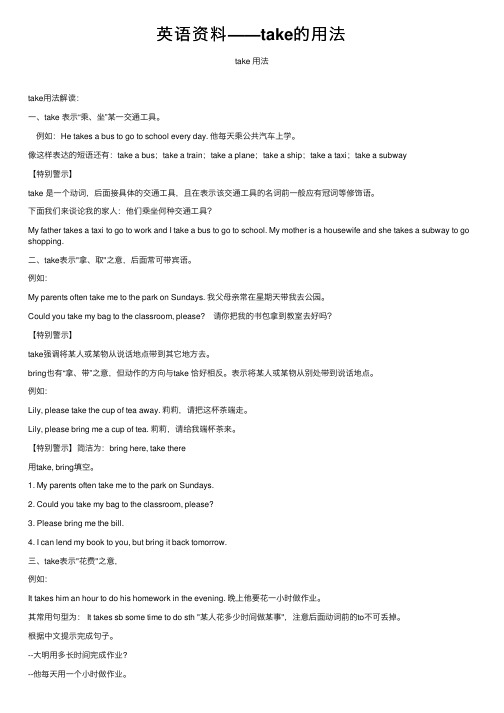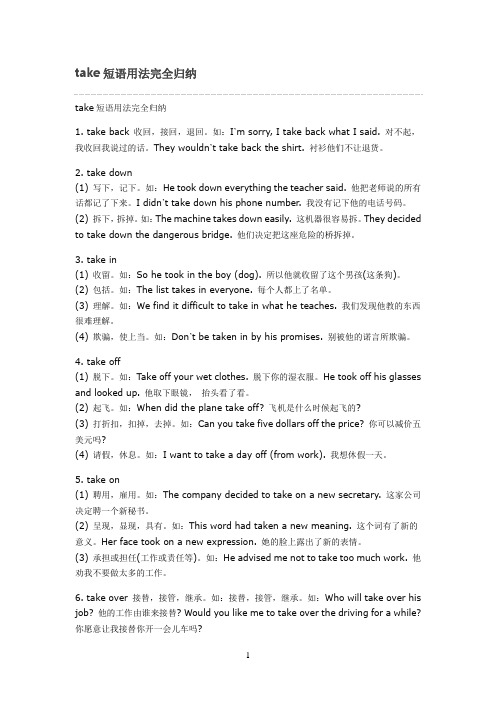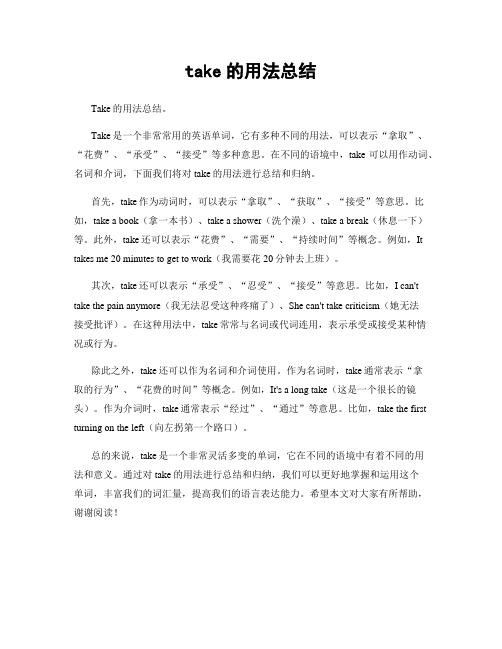从一道高考题聚焦take的用法
take的用法总结大全

take的用法总结大全想了解take的用法么?今天给大家带来了take的用法,希望能够帮助到大家,下面就和大家分享,来欣赏一下吧。
take的用法take的意思vt. 拿,取,采取,接受(礼物等),耗费(时间等)vi. 拿,获得n. 镜头,看法,收入额,场景变形:过去式: took; 现在分词:taking; 过去分词:taken;take用法take可以用作动词take是英语中含义最多,搭配能力最强的动词之一,基本意思是“拿,取,带,抓”,指用手取物、接受东西、把人或物移到某处。
可根据上下文灵活译为“吃,喝,服(药),容纳”“接,接受,提,买”“以为,把…看作…”“花费”“记录,量取”“拍摄”“承担,容忍”“乘坐,搭乘,租用”“取得,获得,得到”“采取,选”“攻下,占领,夺走,赢得”“上钩”“发生效用”等。
take可用作及物动词,也可用作不及物动词。
用作及物动词时可接名词或代词作宾语,也可接双宾语,作“带给”解时其间接宾语可转化为介词to的宾语。
用作不及物动词时主动形式可表示被动意义。
take与某些名词连用,表示做某一动作,相当于have。
take用作动词的用法例句Please take the trash to the garbage can.请将垃圾拿到垃圾筒去。
Take money from the bank when needed.需要时,把钱从银行里取出来。
We are ready to take your order.我们随时准备执行您的命令。
take可以用作名词take用作名词的意思是“捕获量,收入额”,指捕鱼、鸟兽等的数量,也可指交易的金额、赃款、所得金额等,通常用作单数形式。
take也可作“镜头”解,指已拍摄或未拍摄的连续的电影或电视镜头。
take还可作“奏效,反应; 成功”解。
take用作名词的用法例句Love includes gives and takes.爱情包含着给予和索取。
take的用法总结与固定搭配

take的用法总结与固定搭配1. take +noun: 表示"拿取"或"带走",例如:take a book (拿一本书)、take an umbrella (带一把雨伞)。
2. take +object +place: 表示"带/拿...去某地",例如:take a trip (去旅行)、take a walk (散步)。
3. take +object +time: 表示"花费时间做某事",例如:take a shower (洗澡)、take a nap (小睡一会儿)。
4. take +object +adjective: 表示"采取某种行动/态度",例如:take action (采取行动)、take responsibility (承担责任)。
5. take +object +noun: 表示"接受/接管某物",例如:take a phone call (接听电话)、take a message (接收/传递信息)。
6. take +object +verb: 表示"开始/继续进行某事",例如:take a break (休息一下)、take a moment (稍等一下)。
7. take +object +for +noun:表示"把...当作...",例如:take him for a fool (把他当作傻瓜)、take it for granted (认为是理所当然)。
8. take +object +in +noun/gerund: 表示"从事/参与某事",例如:take an interest in (对...感兴趣)、take pleasure in (从...中获得乐趣)。
9. take +object +out +noun: 表示"带某人/物出去",例如:takethe dog out (遛狗)、take someone out for dinner (带某人出去吃饭)。
英语资料——take的用法

英语资料——take的⽤法take ⽤法take⽤法解读:⼀、take 表⽰“乘、坐”某⼀交通⼯具。
例如:He takes a bus to go to school every day. 他每天乘公共汽车上学。
像这样表达的短语还有:take a bus;take a train;take a plane;take a ship;take a taxi;take a subway【特别警⽰】take 是⼀个动词,后⾯接具体的交通⼯具,且在表⽰该交通⼯具的名词前⼀般应有冠词等修饰语。
下⾯我们来谈论我的家⼈:他们乘坐何种交通⼯具?My father takes a taxi to go to work and I take a bus to go to school. My mother is a housewife and she takes a subway to go shopping.⼆、take表⽰"拿、取"之意,后⾯常可带宾语。
例如:My parents often take me to the park on Sundays. 我⽗母亲常在星期天带我去公园。
Could you take my bag to the classroom, please? 请你把我的书包拿到教室去好吗?【特别警⽰】 take强调将某⼈或某物从说话地点带到其它地⽅去。
bring也有“拿、带”之意,但动作的⽅向与take 恰好相反。
表⽰将某⼈或某物从别处带到说话地点。
例如:Lily, please take the cup of tea away. 莉莉,请把这杯茶端⾛。
Lily, please bring me a cup of tea. 莉莉,请给我端杯茶来。
【特别警⽰】简洁为:bring here, take there⽤take, bring填空。
1. My parents often take me to the park on Sundays.2. Could you take my bag to the classroom, please? 3. Please bring me the bill.4. I can lend my book to you, but bring it back tomorrow.三、take表⽰"花费"之意,例如:It takes him an hour to do his homework in the evening. 晚上他要花⼀⼩时做作业。
take的用法及句型

take的用法及句型如下:
take sth. 拿/取某物。
例如:I took my keys from the table.(我从桌子上拿走了我的钥匙。
)take sth. from sb. 从某人处拿/取某物。
例如:He took the book from me.(他从我这儿拿走了这本书。
)
take sth. in one's hand 拿起某物。
例如:She took the cup in her hand.(她拿起杯子。
)
take sth. for sb./sth. 把某物拿给某人/拿给某事物。
例如:Can you take these boxes for me?(你能帮我拿这些箱子吗?)
take sth. as sth. 把某物当做某事。
例如:I take it as a compliment.(我把它当做一种褒奖。
)take off 起飞;脱下;离开;突然成功。
例如:The accident happened as the jet was about to take off.(事故是在喷气式飞机正要起飞时发生的。
)
take up 拿起;开始从事;占据(时间,地方)。
take on 呈现;承担。
总的来说,take的用法及句型有很多,具体使用要根据语境和表达的意思来选择。
关于Take的短语

take短语用法完全归纳take短语用法完全归纳1. take back 收回,接回,退回。
如:I’m sorry, I take back what I said. 对不起,我收回我说过的话。
They wouldn’t take back the shirt. 衬衫他们不让退货。
2. take down(1) 写下,记下。
如:He took down everything the teacher said. 他把老师说的所有话都记了下来。
I didn’t take down his phone number. 我没有记下他的电话号码。
(2) 拆下,拆掉。
如:The machine takes down easily. 这机器很容易拆。
They decided to take down the dangerous bridge. 他们决定把这座危险的桥拆掉。
3. take in(1) 收留。
如:So he took in the boy (dog). 所以他就收留了这个男孩(这条狗)。
(2) 包括。
如:The list takes in everyone. 每个人都上了名单。
(3) 理解。
如:We find it difficult to take in what he teaches. 我们发现他教的东西很难理解。
(4) 欺骗,使上当。
如:Don’t be taken in by his promises. 别被他的诺言所欺骗。
4. take off(1) 脱下。
如:Take off your wet clothes. 脱下你的湿衣服。
He took off his glasses and looked up. 他取下眼镜,抬头看了看。
(2) 起飞。
如:When did the plane take off? 飞机是什么时候起飞的?(3) 打折扣,扣掉,去掉。
如:Can you take five dollars off the price? 你可以减价五美元吗?(4) 请假,休息。
take的几种基本用法

take的几种基本用法
1. take作为动词,表示“拿取、拿走”,用法如:
He took some flowers from the shelf.
他从架子上拿走了一些鲜花。
2. take作为动词,表示“花时间、耗费时间”,用法如:
It took me two hours to finish the work.
我花了两个小时完成这项工作。
3. take作为动词,表示“采取,接受,拿”,用法如:
He was offered a good job, but he took it without consideration.
他接到了一份好工作,但他没有经过考虑就接受了。
4. take作为动词,表示“乘,坐”,用法如:
She takes the bus to school every day.
每天她都乘公交车去上学。
5. take作为动词,表示“测量、量取”,用法如:They are taking blood pressure of the patient. 他们正在给病人测血压。
;。
take短语用法完全归纳总结

take 用法?作为动词,主要有以下几种用法:一、拿,取I want to take some books to the classroom. 我想拿些书到教室。
二、吃,喝,服用,放①Take this medicine three times a day. 每天吃三次药。
②Do you take sugar in your milk? 你喝的牛奶里放糖吗?三、乘车(船)等①Shall we go there by bike or take a taxi? 我们是骑自行车去那还是坐出租车去?②They usually take a bus to work. 他们通常乘公交车上班。
四、常常和it连用,it在句子中作形式主语,真正的主语是后面的不定式。
翻译成“花费(时间、金钱)等”①How long will it take you to do your homework every day? 每天做作业要花费你多长时间?②It usually takes her 20 yuan to buy books every week. 每周买书通常要花费她20元钱。
五、“做……事情”, 常常和名词连用,表示与该名词意义相关的动作例如:take a walk散步, take a rest休息一下, take a look看一看等等。
1.拿,取;握,抱She took his outstretched hand.?她握住他伸出的手。
?She took a piece of paper and began to write a letter.?她拿了一张纸,开始写起信来。
?2.拿走,取走;夺取,占领;抓,捕;吸引The airport had been taken by daybreak.?天亮前机场就被攻占了。
?3.带去;带领[O][O1]Dad took us to the museum last Friday.?上星期五爸爸带我们去博物馆。
take的用法总结

take的用法总结Take的用法总结。
Take是一个非常常用的英语单词,它有多种不同的用法,可以表示“拿取”、“花费”、“承受”、“接受”等多种意思。
在不同的语境中,take可以用作动词、名词和介词,下面我们将对take的用法进行总结和归纳。
首先,take作为动词时,可以表示“拿取”、“获取”、“接受”等意思。
比如,take a book(拿一本书)、take a shower(洗个澡)、take a break(休息一下)等。
此外,take还可以表示“花费”、“需要”、“持续时间”等概念。
例如,It takes me 20 minutes to get to work(我需要花20分钟去上班)。
其次,take还可以表示“承受”、“忍受”、“接受”等意思。
比如,I can't take the pain anymore(我无法忍受这种疼痛了)、She can't take criticism(她无法接受批评)。
在这种用法中,take常常与名词或代词连用,表示承受或接受某种情况或行为。
除此之外,take还可以作为名词和介词使用。
作为名词时,take通常表示“拿取的行为”、“花费的时间”等概念。
例如,It's a long take(这是一个很长的镜头)。
作为介词时,take通常表示“经过”、“通过”等意思。
比如,take the first turning on the left(向左拐第一个路口)。
总的来说,take是一个非常灵活多变的单词,它在不同的语境中有着不同的用法和意义。
通过对take的用法进行总结和归纳,我们可以更好地掌握和运用这个单词,丰富我们的词汇量,提高我们的语言表达能力。
希望本文对大家有所帮助,谢谢阅读!。
- 1、下载文档前请自行甄别文档内容的完整性,平台不提供额外的编辑、内容补充、找答案等附加服务。
- 2、"仅部分预览"的文档,不可在线预览部分如存在完整性等问题,可反馈申请退款(可完整预览的文档不适用该条件!)。
- 3、如文档侵犯您的权益,请联系客服反馈,我们会尽快为您处理(人工客服工作时间:9:00-18:30)。
从一道高考题综述while的用法
看下面一道高考题:
-I\'m going to the post office.
-________you\'re there, can you get me some stamps?
A. As
B. While
C. Because
D. If
对连词的用法考查在每年高考题中均有涉及。
Because引导原因状语从句, If引导条件状语从句,按题干提供的情景均不可取。
While和As都能引导时间状语从句,极易混淆。
As一般强调主句谓语动词与从句谓语动词动作的同时性,而While除可表示同时性外,还含有一个动作在另一个动作正在进行或持续过程中的某一时刻发生。
再从题干所提供的情景判断,就可知道B为最佳答案。
while的用法可从下述几点理解与运用。
一、while意为\"当......时候\",指一段时间,不能用来表示一个时间点。
While the discussion was still going on, George came in. 当讨论还在进行时,乔治走了进来。
二、while意为\"而;然而\",表示转折。
There\'re plenty of rain in the southeast, while there\'s little in the northeast. 东南部雨量充足,而西北部则很少下雨。
三、while意为\"虽然;尽管\",表示让步。
While I admit his good points, I can see his shortcomings. 尽管我承认他的优点,但我还是能看到他的缺点。
四、while意为\"只要\",表示条件。
We can surely overcome these difficulties while we are closely united. 只要我们紧密地团结一致,一定能克服这些困难。
五、while从句中的省略。
当while从句中的主语与主句的主语一致,且含有be的某种形式时,从句中的主语连同be可同时省略。
While listening to the radio, she fell asleep. 她在听收音机时睡着了。
While in London, he studied music and painting. 在伦敦时,他学习音乐和绘画。
六、while可用作名词,意为\"一会儿;一段时间\"。
作名词用时,主要用于短语中: after a while \"过了一会儿\"; all the while \"一直,始终\"; a short / little while ago \"刚才\"; once in a while \"偶尔,间或\"; wait / rest(for) a while \"等/ 休息一会儿\"。
I haven\'t seen her for a long while.我好久没有看见她了。
Where have you been all this while?这一阵子你到哪去了?
He usually goes to work by bike, but once in a while he goes by bus. 他通常骑自行车上班,但偶尔也乘公共汽车。
I looked everywhere for the letter, but it was in my pocket all the while. 我到处找那封信,却不知它一直在我口袋里。
七、while与when以及as之间的区别。
1. 当从句中的谓语动词是持续性的动作时,我们可以用while, when或as。
While / When / As I was walking down the street, I noticed a police car in front of the bank.我顺着马路往前走时,发现银行门前停着一辆警车。
2. 当从句中的谓语动词表示瞬间动作时,不可用while。
He was on the point of leaving when someone knocked at the door. 他正要走,这时有人敲门。
3. 如果谈论两个长动作,最常用的是while。
While John was sitting biting his nails, I was working out a plan to get us home. 约翰坐在那里咬指甲时,我想出了一个回家的办法。
不过, as是可以用来说明两种正在发展或变化的情况的,这时as引导一个持续性的动作,主句中的动作与之同时进行。
As we talked on, he got more and more excited. 我们继续往下谈的时候,他越来越兴奋。
4. 如果表示两个短动作或事件同时发生,最常用的是as或just as,也可用when。
Just as he caught the ball, there was a tearing sound. 当他抓住球的时候,有一种撕裂的声音。
I thought of it just when you opened your mouth. 就在你要说话的时候,我也想到了。
